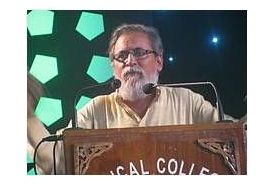 Prof. Anil K Gupta is a nationally recognized leader in innovation and faculty at IIM-Ahmedabad. He is also the founder of Honey Bee Network and executive vice chairman, National Innovation Foundation, Government of India. Prof Gupta talks about innovation
Prof. Anil K Gupta is a nationally recognized leader in innovation and faculty at IIM-Ahmedabad. He is also the founder of Honey Bee Network and executive vice chairman, National Innovation Foundation, Government of India. Prof Gupta talks about innovation
Q. What are the innovations in healthcare with respect from expertise to experimentation?
Prof Gupta: Healthcare sector has witnessed innovations at all stages of the value chain beginning with Preventive health care and hygiene, curative practices through single or multiple curative therapies, medical diagnostic devices, surgical devices, post operative care, rehabilitation therapies, and community health and well being etc.
Many of the experiments unfortunately remain at experimental level and seldom get institutionalized in the polity. There are far more experts we have in healthcare sector.
Q. What are the challenges of inclusive healthcare? And has this implied need for rethinking every link in the healthcare chain?
Prof Gupta: Inclusive health care not only deals with the issue of developing solutions for neglected diseases, but also extending available solutions to the bypassed regions and social segments at an extremely affordable level. It deals with creating Knowledge
Networks which trigger and reinforce lateral learning across different levels of expertise in the sector. The need for what I call as the triangle of inclusive societal satisfaction must have extreme affordability, accessibility and availability. All the three As make the inclusion possible. But policies that create awareness about these options may not always be people oriented or people centric. Large number of good policies has foundered on the ground of actual availability despite having the elements of affordability and accessibility.
The rethinking began when Arvind netralaya created global benchmarks of accuracy, affordability, accessibility and availability. Sometimes one may have to make tradeoffs between accuracy and affordability without any adverse side effects.
Narayan hridalaya, L V Prasad eye care, and many other experiments have created worldwide recognition for Indian efforts in combing four and in some cases three As. But we are still far away from systems biology aspects where multi molecule multi target drug therapies will become routine and mainstream.
Q. How the innovation ecosystem is going to be beneficial for patients?
Prof Gupta: Patients need remedies for their problems, but they also need empowerment for taking care of their needs themselves and to the extent possible of their communities. Different actors in the healthcare value chain need attention and support and obviously a variegated ecosystem can only cater to the diversified needs already felt, many still not felt.
Q. When we talk about innovation has India managed to bring in any X-factor in term of that?
Prof Gupta: Well, yes and no. When we award 25 ideas out of 25000 we get from children all over the country, we obviously don’t bet on too many. But we not ask people o vote on them. Those websites which have used popular vote to select surprising winners have not yet thrown any major surprise. I think organizations are better off by trying a large funnel, try many contradictory approaches, creating both competitive and collaborative approaches, use open innovation platforms which are genuinely symmetrical and reciprocal and then choose the winners
I feel that innovations from students see techpedia.in/award are the most surprising and fascinating ones from formal sector. Informal Sector grassroots innovation have already made waves and attracted large multinational and national corporations to join hands. So something is happening at grassroots level but nothing much is happening at individuals from educational and formal Sector.
Q. Being part of the government circle what you think government on their part should do more to bring in change and innovations in healthcare?
Prof Gupta: It is well established that angel funding at large scale is missing from the private sector or high net worth individuals. But government can revive TePP kind of mechanism which succeeded in sowing many good ideas but unfortunately despite Dr. Mashelkar’s success, subsequent leaders or team killed this program for reasons completely incomprehensible. We need thousand more sectoral responses may be. IIIF will not full this gap ABD that is a tragedy too. May be large corporations should use CSR funds for this purpose.
Q. Do you think for bringing about change in healthcare sector, PPP can contribute more efficiently?
Prof Gupta: PPP can be improved to PPPP that is people, private, public participation which can indeed make a difference to the health care sector
